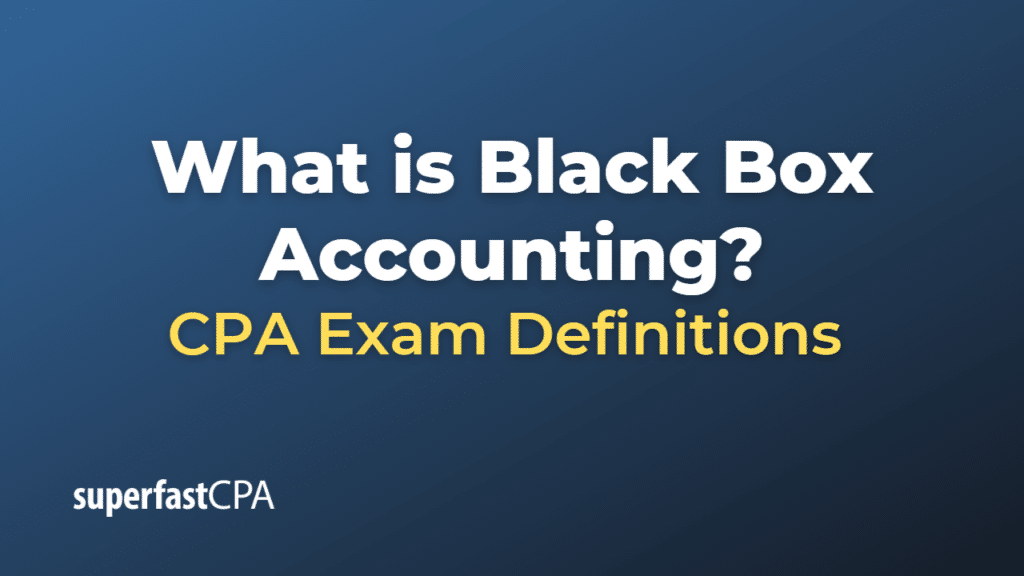Black Box Accounting
Black box accounting, also known as creative accounting or aggressive accounting, is a term used to describe financial reporting practices that involve manipulating financial statements or using accounting tricks to present a company’s financial situation in a more favorable light than it actually is. The term “black box” refers to the lack of transparency in these accounting practices, making it difficult for investors, regulators, or other stakeholders to fully understand the company’s true financial condition.
Black box accounting practices can take various forms, including but not limited to:
- Revenue recognition manipulation: Recording revenue prematurely or delaying the recognition of revenue to influence the company’s reported income.
- Expense manipulation: Capitalizing expenses that should be recognized as operating expenses or deferring expenses to a later period to improve the company’s reported profitability.
- Off-balance-sheet financing: Using complex financing structures, such as special purpose entities (SPEs) or operating leases, to keep debt or liabilities off the company’s balance sheet, making the company appear less leveraged.
- Artificially inflating assets: Overvaluing assets, such as inventory or intangible assets, to boost the company’s reported net worth.
- Cookie jar accounting: Establishing excessive reserves in good financial years and using them to cover losses or expenses in bad financial years, creating a smoother and more consistent earnings pattern.
Black box accounting practices can be unethical and, in some cases, illegal, as they mislead investors and other stakeholders about the company’s true financial health. These practices can also undermine the integrity and reliability of financial reporting, leading to a loss of trust in financial markets and, in some cases, severe financial consequences for the companies involved.
Financial scandals, such as those involving Enron and WorldCom, have highlighted the risks and consequences of black box accounting practices. In response, regulators and standard-setting bodies, such as the Securities and Exchange Commission (SEC) and the Financial Accounting Standards Board (FASB), have implemented stricter rules and regulations to enhance transparency and accountability in financial reporting, including the Sarbanes-Oxley Act in the United States.
Example of Black Box Accounting
Let’s consider a hypothetical example of a company, “SmartGadgets,” that engages in black box accounting to manipulate its financial statements.
SmartGadgets is a technology company that manufactures and sells electronic devices. The company’s management is under pressure to meet investors’ expectations and deliver consistent revenue growth. To achieve this goal, they decide to engage in black box accounting practices that artificially inflate the company’s financial performance.
- Revenue recognition manipulation: SmartGadgets records revenue from sales contracts that have not been fully completed, which results in an overstatement of revenue in the current reporting period. This practice makes it seem like the company’s sales are growing faster than they actually are.
- Expense manipulation: SmartGadgets capitalizes a portion of its research and development (R&D) costs as intangible assets, rather than recognizing them as operating expenses. This practice reduces the company’s reported expenses and increases its reported net income.
- Off-balance-sheet financing: SmartGadgets creates a special purpose entity (SPE) to borrow money and finance the construction of a new manufacturing facility. By keeping the debt off its balance sheet, SmartGadgets appears to have a lower debt-to-equity ratio, which makes the company seem less risky to investors.
- Artificially inflating assets: SmartGadgets overvalues its inventory by using an overly optimistic estimate of the selling price for its products. This practice inflates the company’s reported assets and net worth.
In this example, SmartGadgets is using black box accounting practices to present a more favorable financial picture than its actual performance warrants. These practices may deceive investors and other stakeholders, but they also expose the company to significant risks. If the manipulation is discovered, it could lead to regulatory penalties, loss of investor confidence, and severe reputational damage. In the long run, engaging in black box accounting can undermine a company’s credibility, financial stability, and overall success.













